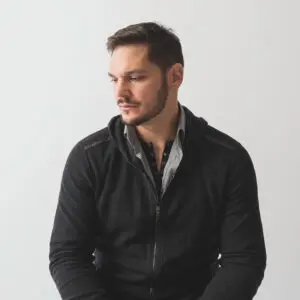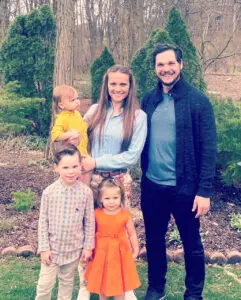Four years after retiring from the National Hockey League (NHL) in 2015, two-time Stanley Cup winner Daniel Carcillo was on the brink.
“I spent three weeks making plans to take my own life,” he says of this time. “I felt I had become a burden . . . and I thought my family would be better off without me.”
At the age of 33 the man known as Car Bomb during his playing days—thanks to his explosive physicality on the ice—was suffering symptoms more commonly attributed to elderly sufferers of dementia.
His struggle with incurable brain damage from hockey had sent him spiraling until hope came from an unlikely source: psychedelic drugs.

His venture comes at a time when both Oregon and Washington, D.C. have decriminalized psilocybin—the active compound found in magic mushrooms. Even though it is still considered a Schedule I illegal substance by the federal government, recent studies have shown psilocybin to be “at least as effective” as available antidepressants when treating patients with depression.
If they are more fully legalized and the science is born out, psychedelic treatments are well-placed to disrupt a mental health market worth nearly $5 billion annually in the U.S. alone.
Battling traumatic brain injuries
It was a combination of seven diagnosed concussions, countless sub-concussions, nine suspensions, and hundreds of in-game fights for teams like the Chicago Blackhawks and the New York Rangers that pushed Carcillo into retirement.
As a player paid to put his body on the line protecting his teammates on the ice, he’d taken as much punishment as he could bear. The surprise came when side effects like light sensitivity and headaches continued long after leaving the sin bins behind.
His repeated head impacts and traumatic brain injuries [TBI] had culminated with a host of symptoms, including slurred speech, headaches, memory loss, disrupted sleep, impulsive behavior, depression, suicidal ideation, and a severe sensitivity to light.
“When you first retire, all you want to do is play with your kids. And [it was] like, well, it’s too sunny outside. There were so many different things happening inside my mind that I couldn’t control or understand. I was literally scared to death,” he says.

“It was the most difficult two and a half hours of my life, by far,” Carcillo says of the first high-gram dose he took under the supervision of a guide.
Following his first trip, Carcillo’s light sensitivity—so bad it had prevented him from looking at the display screen of his phone—disappeared within three days and after three weeks his doctor told him he no longer fit the criteria for clinical depression.
His experience was also the catalyst to becoming an entrepreneur. Carcillo figured his years of research, TBI advocacy, and personal experience in the field could help him develop a psychedelic-based treatment to appeal to the estimated 1.4 million fellow sufferers in the U.S. and even reduce the 60,000 annual deaths TBI contributes to.
He partnered with cannabis entrepreneur Chad Bronstein and launched Wesana Health in May 2020. In just under a year they’ve raised over $20 million from two rounds of funding ahead of today’s launch onto the Canadian Stock Exchange.
How psychedelics work as a medicine
With his partner Bronstein, Carcillo hopes to refine a psilocybin product that could be prescribed by doctors, in macro or micro doses, and combined with other factors to aid recovery of sufferers.
“I think there will be a product offered . . . but I would say most likely it would be part of a prescribed regimen, where we lead a diagnostics program and offer therapeutic support too,” Bronstein says.
The company’s ambition is to build on the history of research exploring the use of psychedelics as medicine. Johns Hopkins University, for instance, has been conducting experimental research into psychopharmacology since 1996, and has found psilocybin to have low potential for abuse.
More recently, a study from Imperial College London showed psilocybin proved just as effective as current antidepressants available in its treatment of patients.
According to Dr. D.J. Cook, chair and head of neurosurgery at Queen’s University in Kingston, Ontario, drugs like psilocybin offer solutions not found elsewhere for conditions like TBI.
“When repetitive head impacts and concussions take place, tau proteins are released as waste material from the tearing and damage,” Cook explains.
These proteins accumulate and further destroy the surrounding brain tissue. It’s why shrinkage of brain mass can be common in severe TBI cases and conditions like chronic traumatic encephalopathy, a disease linked to repeated head trauma.
Cook has studied the physiologic mechanism impairment of TBIs for the last 10 years and he feels psychedelics demonstrate a number of potential benefits to such cases.
“There’s elevation in baseline blood flow during psychedelic experiences. So it may be that these that these treatments improve cerebrovascular auto-regulation [the clearing of the harmful waste proteins].
“[For] people who’ve lost function due to a stroke, their circuitry could be rewired in a positive way, using rehabilitation techniques alongside the psychedelics.”
In his own practice, psychedelics are even used in palliative care, helping his patients to accept the process of dying in a more positive way.
The road ahead
Since Wesana Health’s launch a year ago, the Chicago-based firm has grown to 10 employees and has recruited the likes of George Steinbrenner IV, whose family owns the New York Yankees, and former undisputed heavyweight world champion Mike Tyson among the advisors to their board.
The team sees opportunity for potential partnerships with sport franchises that have a high ratio of participant TBIs. Activities like boxing, mixed martial arts, and football are obvious opportunities for the future, alongside sports like rugby and soccer where TBI risk is only now being recognized.
There’s also the potential impact such natural alternatives could have on the more established pharmaceutical mental health industry. According to the Centers for Disease Control and Prevention, one in five adults in the U.S. experience some form of mental health issue in any given year, suggesting the presence of widespread need.
And though the barrier of government Schedule-I status and Food and Drug Administration approval for any medicinal psilocybin products remain, partnerships like those between New York University’s new Center for Psychedelic Medicine and biotech startup MindMed are creating a pathway to respectability and potential legislative reform.
“The war on drugs did a really good job of making people dismiss this right away, it’s so heavily stigmatized,” Carcillo says.
“I think the more people that we can help, and the more people that do their research, tell their own stories, the better,” he says.
A skeptic might point out that Carcillo has a lot to gain from perpetuating the inspirational qualities of his trip-fueled return to mental health. Some, like researcher and author Balazs Szigeti, argue the positive effects of microdosing are nothing more than a placebo effect.

“In my experience it’s not unusual to find patients who have chronic issues related to TBI exposure, and then to set them on a path [with psychedelics] where they have an extraordinary resolution within months.”
Understanding of how psychedelics could be used as medicine remains in its infancy but—whether through the building of new neurons, the rewiring of current brain networks, or promoting recovery methods the body can’t normally access—Cook is bullish on the future.
“I think we’re on the cusp of an absolute revolution. With increased social awareness of mental health issues . . . and [potential] regulatory changes, I think this is a transformational time,” Cook says.
For Carcillo, it’s an echo of his own personal belief in the power of psilocybin and the medical and spiritual journey he’s travelled so far.
“I get goosebumps thinking about where I came from and where we are today, [and that’s] the mission: provide hope to TBI survivors [to show] there are other options available.”
Recognize your brand’s excellence by applying to this year’s Brands That Matter Awards before the early-rate deadline, May 3.
